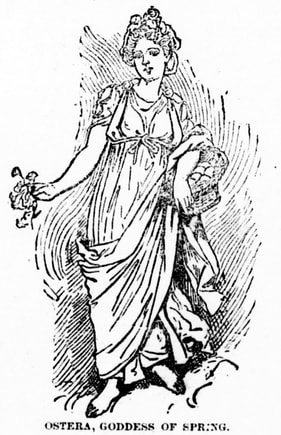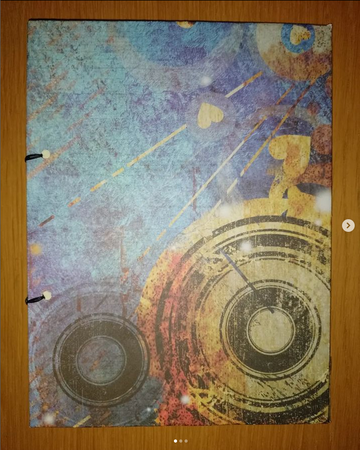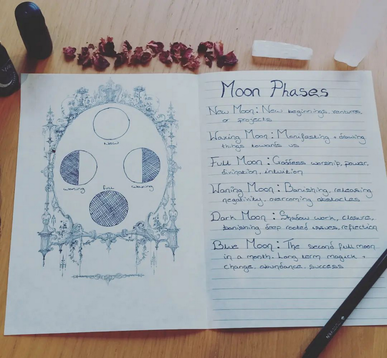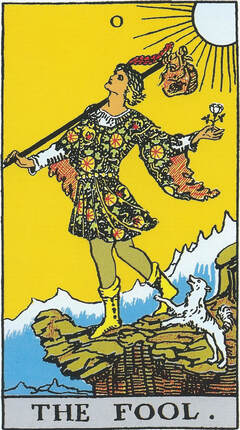|
Ostara is the Spring equinox, the second of the fertility festivals, and usually falls around March 21st. The sun has been growing in strength and the days becoming longer. The spring equinox represents the point where day and night are of equal length, before the days officially become longer than the nights. The promise that was made at Imbolc is being fulfilled, and the flourishing of the earth can already be seen, with the earliest of spring plants starting to bloom. This is a festival of fertility, where we celebrate the plants, and the crops that are about to grow. Eggs are an important symbolism at this time, as they represent fertility and new life, as is nurturing that which has just been brought into the world. At Imbolc we sowed the first of our seeds, and will continue to do so as the conditions demand; for example, many vegetables require planting around about March/April time. It is important for many seedlings to keep them warm and covered, especially against the frost. This is easier said than done, as with the effects of climate change, we are becoming more prone to later frosts. However, this care and compassion is necessary to ensure a successful harvest later on. This festival is often associated with the Germanic Goddess Eostre. But who was she? And, possibly the most pressing question, was she 'real'? Or made up by an 8th Century Saint? There is no reference to Eostre in pagan sources. The only reference to her is from Saint Bede in his 8th Century works De temporum ratione (The Reckoning Of Time). In his works, Bede discusses the names of the months as referred to by the indigenous English peoples through the following translated text: Eosturmonath has a name which is now translated "Paschal month", and which was once called after a Goddess of theirs named Eostre, in whose honour feasts were celebrated in that month. Now they designate that Paschal season by her name, calling the joys of the new rite by the time-honoured name of the old observance. This is the one time up until this point that Eostre is mentioned. There are no inscriptions, no depicitions, nothing. This has lead some scholars to believe that Bede invented Eostre, or at the very least took some 'creative licence' in basing her off of other deities. In 1835, Jacob Grimm entered the fray with his own view on Eostre. Here are some of the passages taken from some of his writing about the Goddess: We Germans to this day call April 'ostermonat', and 'ostarmanoth' is found as early as Eginhart [a Frankish scholar]. The great Christian festival, which usually falls in April or the end of March, bears in the oldest of OHG remains the name 'ostara'...it is mostly found in the plural, because two days...were kept at Easter. This 'Ostara', like the [Anglo-Saxon] 'Eastre', must in heathen religion have denoted a higher being, whose worship was so firmly rooted, that the Christian teachers tolerated the name, and applied it to one of their own grandest anniversaries. .................... Ostara, Eástre seems therefore to have been the divinity of the radiant dawn, of upspringing light, a spectacle that brings joy and blessing, whose meaning could be easily adapted by the resurrection-day of the Christian's God. Bonfires were lighted at Easter and according to popular belief of long standing, the moment the sun rises on Easter Sunday morning, he gives three joyful leaps, he dances for joy ... Water drawn on the Easter morning is, like that at Christmas, holy and healing ... here also heathen notions seems to have grafted themselves on great Christian festivals. Maidens clothed in white, who at Easter, at the season of returning spring, show themselves in clefts of the rock and on mountains, are suggestive of the ancient goddess. ...................... But if we admit, goddesses, then, in addition to Nerthus, Ostara has the strongest claim to consideration. To what we said on p. 290 I can add some significant facts. The heathen Easter had much in common with May-feast and the reception of spring, particularly in the matter of bonfires. Then, through long ages there seem to have lingered among the people Easter-games so-called, which the church itself had to tolerate : I allude especially to the custom of Easter eggs, and to the Easter tale which preachers told from the pulpit for the people's amusement, connecting it with Christian reminiscences. Grimm's view was essentially that Eostre was a local Goddess based on a more widespread Goddess, and it was Grimm that named this Goddess as Ostara. Like Eostre, it is difficult to tell whether Ostara existed in the wider world, or whether this was all speculation on Grimm's part.
As I said, Eostre and Ostara's validity as 'real', ancient deities that were worshipped and venerated is a hot topic amongst scholars. Other theories around deities with similar names, roots of names, etc. - far too many to go into here. For example, a cluster of place names in England contain a variety of Germanic and English names which include the element 'eostre'. There is no doubt as to the word 'eostre' existing, but whether it was also the name of a Goddess, and a Goddess related with Easter, is still very much up for debate. However, don't let this stop you from working with this energy! My personal view of deity is that there is one 'universal energy', and that deities are interpretations of this energy - like the faces of a diamond. As such, she is just one face of this energy, and is no less valid. She may very well have existed, or she may well be a retelling of some other ancient Goddess. However, whether she exists or not is an interesting scholarly debate, and one which appears to be very divisive!
0 Comments
16/3/2023 0 Comments Building Your Own Book Of ShadowsA BoS, or Book of Shadows, is a witches manual. Many practitioners place a lot of importance on their BoS and will spend hours creating elaborate books filled with information. However, there is so much you can include that it can be difficult to know where to start! One of the main problems when creating a book of shadows is that you are constantly learning. If you start with a fancy notebook and write what you've learned about tarot, and then move on to write about what you have learned about bird divination, chances are that at some point in the future you are going to learn more about tarot. Then your only option is to either pull the book apart, or add another tarot section, and the whole thing can become messy and out of synch. For this reason, I personally prefer to build my own with 'loose' pages. I actually learned book binding for this very purpose! But remember, as you learn your BoS will also grow, so it is probably best to go for a format that allows you to add and remove pages. Similarly, when it comes to how you decorate your pages, remember you are probably going to amass a lot of them! I made the mistake of starting off using a fancy sort of paper which then went out of print and struggled to find a replacement. Another thing I do recommend if you are looking for something with a bit more of a design is to take a look on Etsy or similar for blank, printable pages with designs on which you can then print on to blank paper of your choosing and write over. Or maybe you want to go completely modern and just have a digital book of shadows? There are many reasons that a digital BoS could be preferable; it's cheaper, easier to access on the go, and you have more freedom to add and remove pages as you go. There are definitely benefits to having a digital BoS, but for a lot of people (such as myself), creating a physical BoS is personal, creative, and fun! Once you have decided on the format of your BoS you need to think about what to put in it. Again, with the more you learn, the more you will want to add, and potentially remove. Your BoS should mirror your own experience, and again this is another area where we can become overwhelmed. It can be very tempting to add information about tarot even though you have never studied tarot, just because you feel like you should. If you go down this route you will find it becomes very time consuming, and again once you actually decide to start learning tarot you will learn a lot more information that you will need to add in, or could even make the original information you added redundant. Another aspect you need to consider is do you just want to contain 'factual' information, or do you want to include your own experiences? For example, using tarot again, do you want to include different spreads, but do you also want to record all of your individual tarot readings alongside it? Do you want to write a bit about a specific deity, but do you also want to record any experiences you have with them? I personally keep these two elements separate; my BoS is more of a manual, or reference book, and then I have separate notebooks that I record my experiences in. I've been practising for over 20 years now - if I also recorded every experience or every divination reading I have done, my BoS would be far too large to manage!
Below I have written a list of what you could potentially add to your own book of shadows, and based on the above I recommend that rather than just researching each subject, you make an effort to actually give these things a try. This will also help you weed out what is good, accurate information and what is just fluff - the last thing you want is to be adding misinformation to your BoS! Even this list is just a small drop in the ocean! There will be many, many more things you can add to it. Alphabets Animal magick Bird Divination Candle magick Colour magick Correspondences tables Crystal magick Deities Elements and elementals Food magick Herb magick Lithomancy Magickal cleansing Magickal protection Moon Phases Planetary Correspondences Sabbats Scrying Spells and rituals Tarot Working with guides Working with spirits So, in short, here some tips and tricks to help you when creating your own BoS: 1. Go for loose leaf rather than a book with restrictive pages so you can add/remove pages, or a digital version 2. Try and go for a consistant design you can maintain through lots of pages! 3. Decide whether you want to include just factual information or your experience also 4. Try to split it into sections based on the subjects you are writing about 5. Have an active go at everything you are writing about! 6. Include a table of contents 7. Personalise your BoS; this can be through the decoration, or you might want to write a book blessing for the front page or cover The most important thing is to have fun! Your BoS can become a very personal and important part of your practice that you will grow to cherish, so it is definitely worth putting the effort in. 1/3/2023 0 Comments Tarot Prompt: The FoolIn an effort to improve my tarot skills, I've been reading Silvia Hill's Tarot for Beginners: A Simple Guide to Reading Tarot Cards, Basic Spreads, and Psychic Development. I LOVE this book! I will do a proper review of it once I have finished it, but one thing I am enjoying is the tale of The Fool's journey through the Major Arcana, and the questions/prompts which are given for each card. So once a week I'm going to post one of the prompts on Instagram and write a blog post with my thoughts on that question/prompt. For the first card in the Major Arcana, our 'leading man' The Fool, our two prompts are: How might The Fool's journey differ if he were aware of the danger he was in? What do you think The Fool represents for people in different stages of life? The Fool is the first card of The Major Arcana and represents new beginnings, innocence, and potential. But what if he knew the dangers he faced? What does he represent for people in the different stages of their lives? Below are my thoughts. If The Fool had known the dangers he would encounter before he set off before his journey, things may have been very different. He may not have started out at all for fear that where he ended up would be worse than where he started from. And even now, with him having been through that journey and through profound change, do we know for certain he is happier and better off?
If he did still decide to start out on his journey, he may have been a lot more cautious, trying to avoid those dangers. It might have changed his experience completely. But again, can we say for certain that it would have been a better or worse experience than the one he would have experienced if he hadn't known what his original journey would hold? Or maybe The Fool's journey was set to follow that path no matter what he did? Maybe, no matter whether he had stayed behind or started on his journey, no matter what he did along the way, he would still in some form experience the themes of the Major Arcana on his path, just in different ways? Maybe the themes and opportunities of the Major Arcana are unavoidable in life in some capacity or another (big or small, life changing or life progressing), and it is the attitude of The Fool rather than his physical actions which determine whether he will come out better or worse for the experience? Would I have the guts to leave everything I have behind for the possibility of something better? I'll be honest, I'm very content with my life, so probably not. Would I look for the positives and the learnings in all of the themes of the Major Arcana if I had no choice but to experience them, rather than trying to avoid them or pretend they aren't happening? Yeah, I like to think I would. As for The Fool in different stages in life, I touched upon it briefly above. I own a flat, have a decent job, friends, I have published a couple of books and generally don't want for anything. I am very content with my life. With The Fool's journey being unknown and the end consequence of it still a mystery, I probably wouldn't set out on it. If I were in a different position, if I were struggling to make ends meet, didn't have much to my name and little responsibility, then I would be much more open to the journey. In terms of 'stages of life' I don't see these stages as being age defined, but comfort defined. The happier and more satisfied you are with your life, the less likely you are to want to do anything which could risk it. I know that is how I personally feel anyway. And as discussed above also, sometimes we have no choice but to go through this journey - let's say the death of a loved one, losing your job, etc. In this case, at this stage of life, it becomes more about preserving what you already have rather than chasing something new. It isn't necessarily a bad thing, but it changes the nature of the fool's journey and his attitude towards anything 'new', 'unknown', or potentially 'life changing'. Again, is this worth risking when you are comfortable with what you have? For me personally no, not if the reward is not guaranteed. |
The Weekly Witch:Once I week I talk about something 'witchcraft' related I have done with my week. How we incorporate witchcraft into our every day lives is always a topic that has interested me, so I wanted to start this blog to explore it further! Archives
August 2023
Categories |





 RSS Feed
RSS Feed
